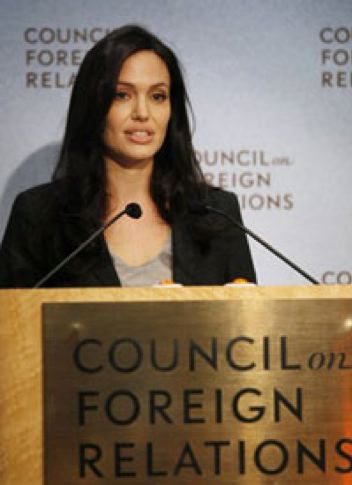
Angelina Jolie, who has been passionately involved for several years with refugees from the ongoing genocide in Darfur, spoke at the CFR symposium in support of the effort to bring Sudanese President Omar Hassan al-Bashir to trial before the International Criminal Court (ICC).
"Over the past seven years, I’ve worked with UNHCR and I’ve traveled around the world trying to bring attention to refugees," she said. "It’s been a remarkable education."
"I’ve seen refugees return to live among the same people who attacked them," she said. "They are returning to the same lawlessness that sent them running in the first place. I’ve seen aid workers tear up as they put ladies on a bus and say, ‘I don’t know what we’re sending them back to.’"
"I don’t know if the ICC is the answer. And I don’t know what type of court is, or what it would need to be to make all of us agree and make it strong enough," Jolie admitted. "But I do know this: No mother who had her children killed in front of her, no young girl sold into slavery, no boy kidnapped and forced to be a child soldier and no young girl like the 3-year-old I met in Sierra Leone, who had her limbs cut off, should be expected to simply forget. No one should have to choose between peace and justice."
Jolie, who was on a break from promoting her upcoming movie Changeling, brought a touch of glamour and drama to the gathering of foreign policy experts (including advisers to Senators Barack Obama and John McCain).
Luis Moreno-Ocampo, chief prosecutor of the ICC, spoke to the CFR about the court’s cases in Sudan. "People in Darfur are targeted by the very people who are supposed to protect them," he said. "The call for justice is not going away." According to the CFR website, Moreno-Ocampo "then urged individuals to recognize the importance of the court’s work in shifting public opinion on international justice."
"Shifting public opinion"— and more especially, shifting the opinions of opinion molders, politicians, and public policymakers — is what the CFR has been all about since its founding in 1921. It was one of the principal forces pushing for U.S. entry into the League of Nations after World War I. That effort failed due to the U.S. Senate’s refusal to ratify the League treaty, which was rightly seen as an assault on U.S. sovereignty and an attempt to establish world government. After World War II, CFR members were instrumental in designing and establishing the United Nations, the World Bank, and the International Monetary Fund.
The late Admiral Chester Ward, a former Judge Advocate General of the U.S. Navy and a member of the CFR from 1959-1977, knew firsthand about the semi-secret group’s influence and modus operandi:
Once the ruling members of CFR have decided that the U.S. government should adopt a particular policy, the very substantial research facilities of CFR are put to work to develop arguments, intellectual and emotional, to support the new policy, and to confound and discredit, intellectually and politically, any opposition. The most articulate theoreticians and ideologists prepare related articles, aided by the research, to sell the new policy and to make it appear inevitable and irresistible. By following the evolution of this propaganda in the most prestigious scholarly journal in the world, Foreign Affairs, anyone can determine years in advance what the future defense and foreign policies of the United States will be. If a certain proposition is repeated often enough in that journal, then the U.S. administration in power – be it Republican or Democratic – begins to act as if that proposition or assumption were an established fact.
In his 1975 book Kissinger on the Couch (co-authored with Phyllis Schlafly), Admiral Ward warned that the goal of the CFR is the "submergence of U.S. sovereignty and national independence into an all-powerful one-world government." He noted that "this lust to surrender the sovereignty and independence of the United States is pervasive throughout most of the membership." He added: "In the entire CFR lexicon, there is no term of revulsion carrying a meaning so deep as ‘America First.’"
The ICC, which has been set up in a new headquarters in The Hague, has not been a burning issue in U.S. politics for the past few years. The ICC treaty was signed by President Bill Clinton, but Senate ratification was blocked by conservatives and constitutionalists who recognized the dangers it posed to U.S. sovereignty mounted a national campaign against it. President Bush, bowing to the conservative pressure, "unsigned" the ICC treaty and has been outspokenly critical of it. However, as ICC observers have noted, the Bush administration has backed off from the president’s earlier strident stands, and in the case of Darfur, has been supportive of the ICC.
The CFR "Backgrounder" entitled Africa and the International Criminal Court notes:
After initially opposing the ICC out of fear it would be used for politically motivated prosecutions of U.S. personnel abroad, Washington seems to be softening its stance on the court. When the Security Council voted to refer the issue of Darfur to the ICC in March 2005, the United States abstained rather than vetoing the referral. This act moved the United States "from a posture of active opposition to the very existence of the court to a position much closer to… acquiescence in the court’s existence even though it had problems with its conception," said CFR Senior Fellow Lee Feinstein in an interview with CFR.org. Washburn notes that the United States has set up a formal channel of communication between the State Department and the ICC to work on Darfur, headed by the State Department’s legal adviser, John Bellinger II.
Bellinger, like so many of his State Department colleagues (in both Democratic and Republican administrations), is a member of the CFR. The CFR now insists it is not promoting world government, only "global governance" — which, in reality, turns out to be a distinction without a difference. The CFR ongoing drive for world law assumes the need for world lawmakers, world law enforcers, world law prosecutors, and world law courts. All of which adds up, incrementally, to an effective world government, that would directly threaten U.S. sovereignty and the rights of U.S. citizens under our constitutional system.
Angelina Jolie said, "I don’t know if the ICC is the answer" for Darfur and other cases of genocide and war crimes. Unfortunately, there are no easy answers for these terrible cases. The ICC, however, may prove to be a remedy worse than the problem.
For more on the International Criminal Court see, "Courting Global Tyranny."
AP Images

